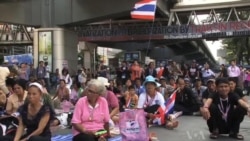BANGKOK —
Thailand's anti-government protesters are vowing to oust Prime Minister Yingluck Shinawatra and her family from politics even if Sunday’s elections reaffirm her popular support. Thai experts say mediation is needed to prevent further violence, and so far there are few signs of negotiation.
Thailand's protesters, like Surachet Sinkreawan, say they are undeterred by the government's decision to proceed Sunday with national polls.
The mainly middle and upper class protesters want to suspend elections that their candidates in the Democrat Party keep losing and replace the government with an unelected council that will push through unspecified reforms.
“We will not lose, even though the government goes ahead with the election. But I am not sure whether any violence will occur like it did on advance voting day,” said Surachet.
Protest leader Suthep Thaugsuban said he and his supporters do not intend to block voters Sunday, but aim to eliminate the Shinawatra family and loyalists from politics.
If protesters, the courts or the army make good on such threats, it likely would cause the government's Red Shirt supporters in the north to rise up, risking violent conflict.
Kriengsak Chareonwongsak, president of the Institute of Future Studies for Development in Thailand, said, “You either negotiate before the violent clashes or you do it afterward. Somewhere, negotiation must happen. And, I think it will happen in Thailand. Unfortunately, my prediction now: [if] it is going this way without change, it will be after bloodshed.”
The Thai military has often stepped in when political violence escalated. While many oppose another military coup, independent legal analyst Verapat Pariyawong said the military remains the most likely mediator.
“So, if there's going to be someone who can conduct a principled mediation, which is in itself quite against the principle because I don't think the military is supposed to be conducting mediation between the government and protest leaders, but it has to be the military," said Verapat. "And, I think the only legitimate way for that to happen is for there to be a strong turn-out on February 2nd so Thai people can send the message to the military commanders that they want this country to move forward.”
Even if Sunday’s voting goes smoothly, protesters already succeeded in blocking enough candidate registrations to prevent the government from filling the 475 seats needed to convene parliament.
That leaves Thailand's future in a dangerous power vacuum.
Thailand's protesters, like Surachet Sinkreawan, say they are undeterred by the government's decision to proceed Sunday with national polls.
The mainly middle and upper class protesters want to suspend elections that their candidates in the Democrat Party keep losing and replace the government with an unelected council that will push through unspecified reforms.
“We will not lose, even though the government goes ahead with the election. But I am not sure whether any violence will occur like it did on advance voting day,” said Surachet.
Protest leader Suthep Thaugsuban said he and his supporters do not intend to block voters Sunday, but aim to eliminate the Shinawatra family and loyalists from politics.
If protesters, the courts or the army make good on such threats, it likely would cause the government's Red Shirt supporters in the north to rise up, risking violent conflict.
Kriengsak Chareonwongsak, president of the Institute of Future Studies for Development in Thailand, said, “You either negotiate before the violent clashes or you do it afterward. Somewhere, negotiation must happen. And, I think it will happen in Thailand. Unfortunately, my prediction now: [if] it is going this way without change, it will be after bloodshed.”
The Thai military has often stepped in when political violence escalated. While many oppose another military coup, independent legal analyst Verapat Pariyawong said the military remains the most likely mediator.
“So, if there's going to be someone who can conduct a principled mediation, which is in itself quite against the principle because I don't think the military is supposed to be conducting mediation between the government and protest leaders, but it has to be the military," said Verapat. "And, I think the only legitimate way for that to happen is for there to be a strong turn-out on February 2nd so Thai people can send the message to the military commanders that they want this country to move forward.”
Even if Sunday’s voting goes smoothly, protesters already succeeded in blocking enough candidate registrations to prevent the government from filling the 475 seats needed to convene parliament.
That leaves Thailand's future in a dangerous power vacuum.





